Introduction
Navigating the financial landscape of franchise ownership can be a daunting task for aspiring entrepreneurs. With various costs ranging from initial franchise fees to ongoing royalties and marketing contributions, understanding these financial components is essential for long-term success.
In an environment where competition is fierce and operational costs are on the rise, franchisees must equip themselves with the knowledge and tools necessary to craft a comprehensive budget.
This article delves into the intricacies of franchise financing, evaluates the critical aspects of franchise agreements, and provides practical budgeting strategies to help franchisees make informed decisions.
By exploring these key elements, aspiring franchise owners can lay a solid foundation for their business, ultimately steering their venture toward profitability and growth.
Understanding the Financial Landscape of Franchise Startups
Starting the journey of business ownership requires a thorough understanding of various financial components that aspiring owners must navigate. The initial licensing fee is a crucial factor in the cost to start a franchise, typically ranging from a modest few thousand dollars to upwards of $50,000, depending on the brand and its market presence. This fee not only secures the right to operate under the franchisor’s established name but also grants access to a well-defined support system, which can be invaluable in the early stages of business.
For instance, BCHEF opened 21 restaurants by the end of 2016, showcasing the potential for growth within the franchise model. Beyond this initial investment, individuals managing the franchise should also meticulously budget for the overall cost to start a franchise, which includes essential expenses such as:
- Real estate acquisition
- Renovations to create a welcoming environment
- Equipment procurement
- Initial inventory purchases
- Crucial marketing expenses to attract customers
Ongoing financial commitments further complicate the budgeting process. Royalties and promotional charges, which typically range from 4% to 10% of sales, are recurring expenses that business owners must plan for. These fees are vital for maintaining the brand’s visibility and support, but they can add up significantly over time.
Recent reports indicate that new fast-food operators face an array of challenges, including fierce competition and rising operational costs, making it imperative for them to maintain high customer service standards while adapting to shifting consumer preferences. As Julien Perret aptly states, “BCHEF’s focus on innovation and customer experience sets it apart in the competitive fast-food market,” emphasizing the necessity for business owners to prioritize these elements in their operations.
Comprehending these economic complexities enables business owners to create a thorough budget, which helps in evading the typical mistake of underestimating their monetary requirements, particularly the cost to start a franchise. The case study of KFC illustrates this point well; the brand’s success is largely attributed to Harland Sanders’ unique secret recipe, which has contributed to its growth into one of the largest fast-food chains in the world with over 24,000 restaurants. With the average initial fee in 2024 reflecting these economic pressures, careful financial planning is not just advisable—it is essential for long-term success in the business sector.
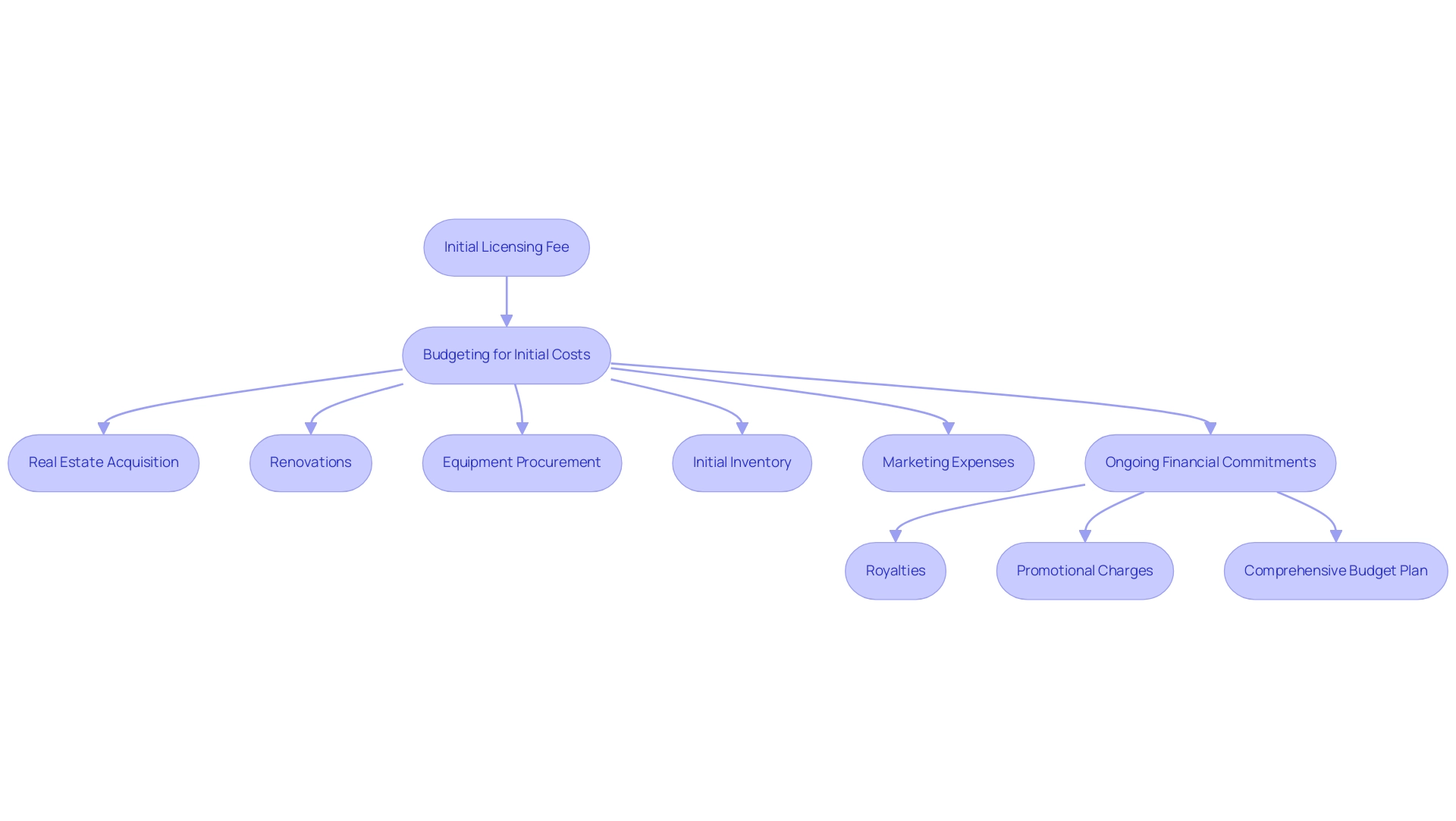
Exploring Financing Options for Your Franchise Journey
Aspiring business owners have a range of financing options at their disposal to cover the cost to start a franchise, each with unique advantages. Traditional bank loans remain a common choice, typically requiring a solid credit score—often around 680 to 700—and collateral to secure funds. However, many find Small Business Administration (SBA) loans to be a more appealing alternative due to their lower interest rates and extended repayment terms.
These loans, which generally feature interest rates ranging from 6% to 9% and repayment terms that can extend up to 25 years, are particularly appealing for new business owners looking to manage their cash flow effectively. As Hoque Figueroa, co-owner of F45 Virginia, emphasizes, ‘Daire made it happen! There is no doubt that Swoop sped up the process and found lenders that worked to our time scale rather than the other way round.’
This emphasizes the significance of strategic collaborations in managing financing choices. In addition to SBA loans, aspiring business owners should also consider:
- Mortgages
- Home Equity Lines of Credit (HELOCs)
as viable financing options. Mortgages can offer significant funding for acquiring business locations, while HELOCs enable owners to utilize their home equity for extra capital.
Franchisors can play a vital role by providing financing assistance or recommending specialized lenders who can help with the cost to start a franchise. Moreover, the landscape of financing is evolving, with alternative sources like crowdfunding and peer-to-peer lending gaining popularity. These platforms enable hopeful business owners to gather funds from various investors, broadening their financial reach.
To further support business owners, DueDilio connects clients with M&A advisory experts who assist in the SBA loan process, providing additional guidance and resources. Entrepreneurs must thoroughly evaluate these financing choices to ensure they secure adequate support for the cost to start a franchise throughout their franchising journey. Including case studies on online lenders can also illustrate the pros and cons of different financing options; while they offer convenient application processes and faster approvals, they may come with higher interest rates and lack personal relationships, making it essential for franchisees to weigh their options carefully.
For those interested in exploring these funding avenues, consulting with advisors or franchisors can provide valuable insights and assistance.

Evaluating Franchise Agreements and Costs
Business agreements often encompass a range of costs, including the cost to start a franchise, that extend far beyond the initial fee. The cost to start a franchise includes key monetary obligations such as ongoing royalty payments, marketing contributions, and renewal fees, all of which can significantly impact your bottom line. A meticulous review of the disclosure document (FDD) is crucial, as it outlines detailed financial information and obligations associated with the business.
Engaging a legal expert specializing in business law can be invaluable in interpreting these terms and negotiating more favorable conditions. As Robert Lee Marshall, a criminal defense attorney in Oroville, CA, who has earned 9 Top Contributor badges on Avvo, advises,
It never hurts to get a second opinion. Employing a lawyer to examine all elements of your business agreement could save you significantly more money in the future.
This sentiment is echoed by Matthew J. Kreutzer, who emphasizes that consulting with an experienced business attorney is essential. These professionals can identify potential red flags and advise on risks that may not be immediately apparent. A case study titled ‘The Need for Legal Consultation’ highlights how multiple attorneys stress the significance of consulting with a specialized lawyer before entering agreements, as they can identify risks and prevent expensive errors.
Additionally, resources like Avvo can assist you in finding attorneys for various legal matters. By thoroughly assessing business agreements, potential owners can prevent misunderstandings and avoid financial surprises related to the cost to start a franchise, paving the way for a more successful ownership experience.
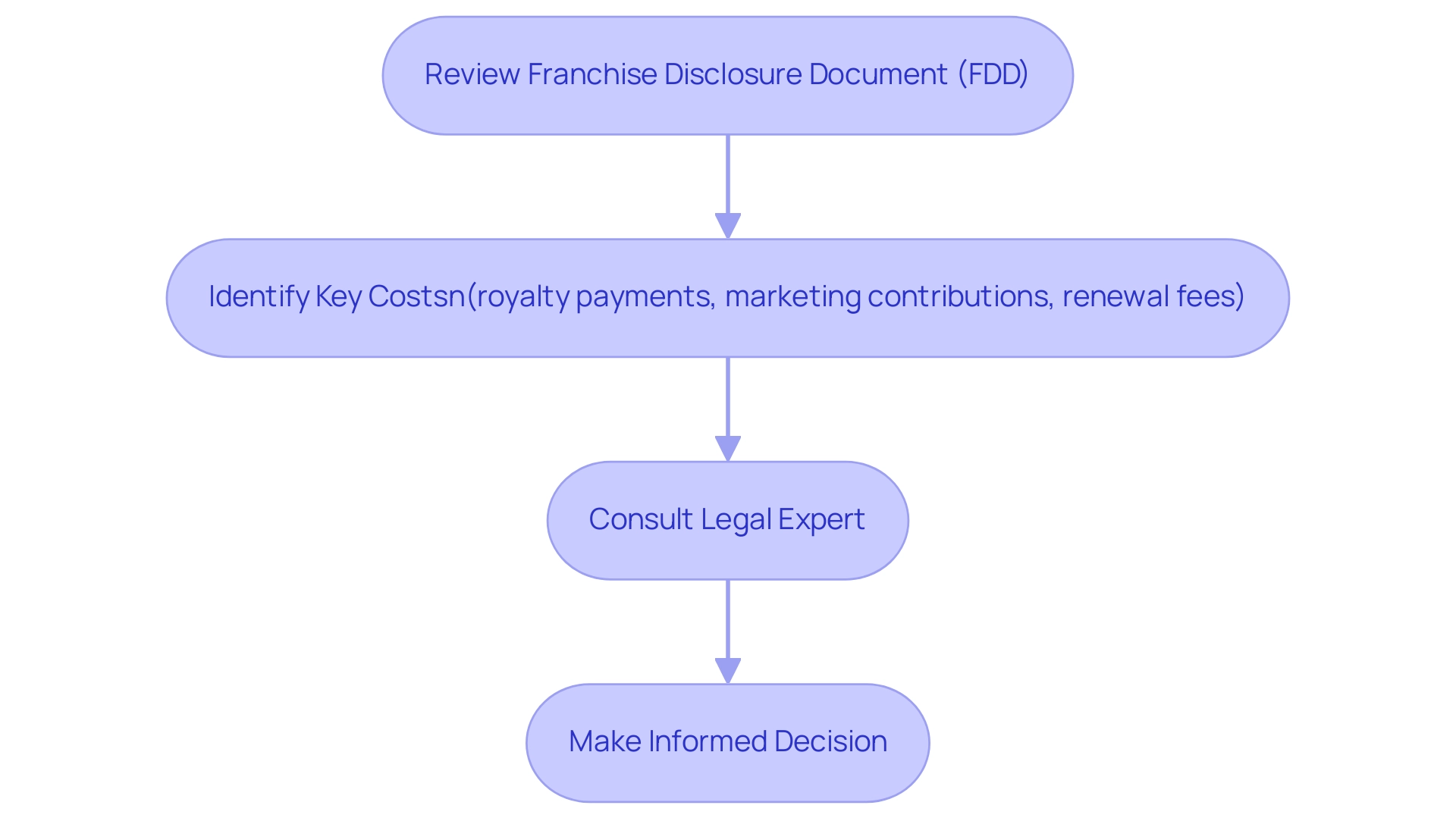
Budgeting for Initial and Ongoing Expenses
To budget effectively, business owners should list all initial costs, including the cost to start a franchise, such as:
- Fees
- Equipment
- Marketing
alongside ongoing expenses like:
- Rent
- Utilities
- Employee wages
It’s essential to project revenue based on realistic sales forecasts and to include a buffer for unexpected expenses. Regularly reviewing and adjusting the budget can help franchisees stay on track financially and make informed decisions about reinvestment and growth opportunities.
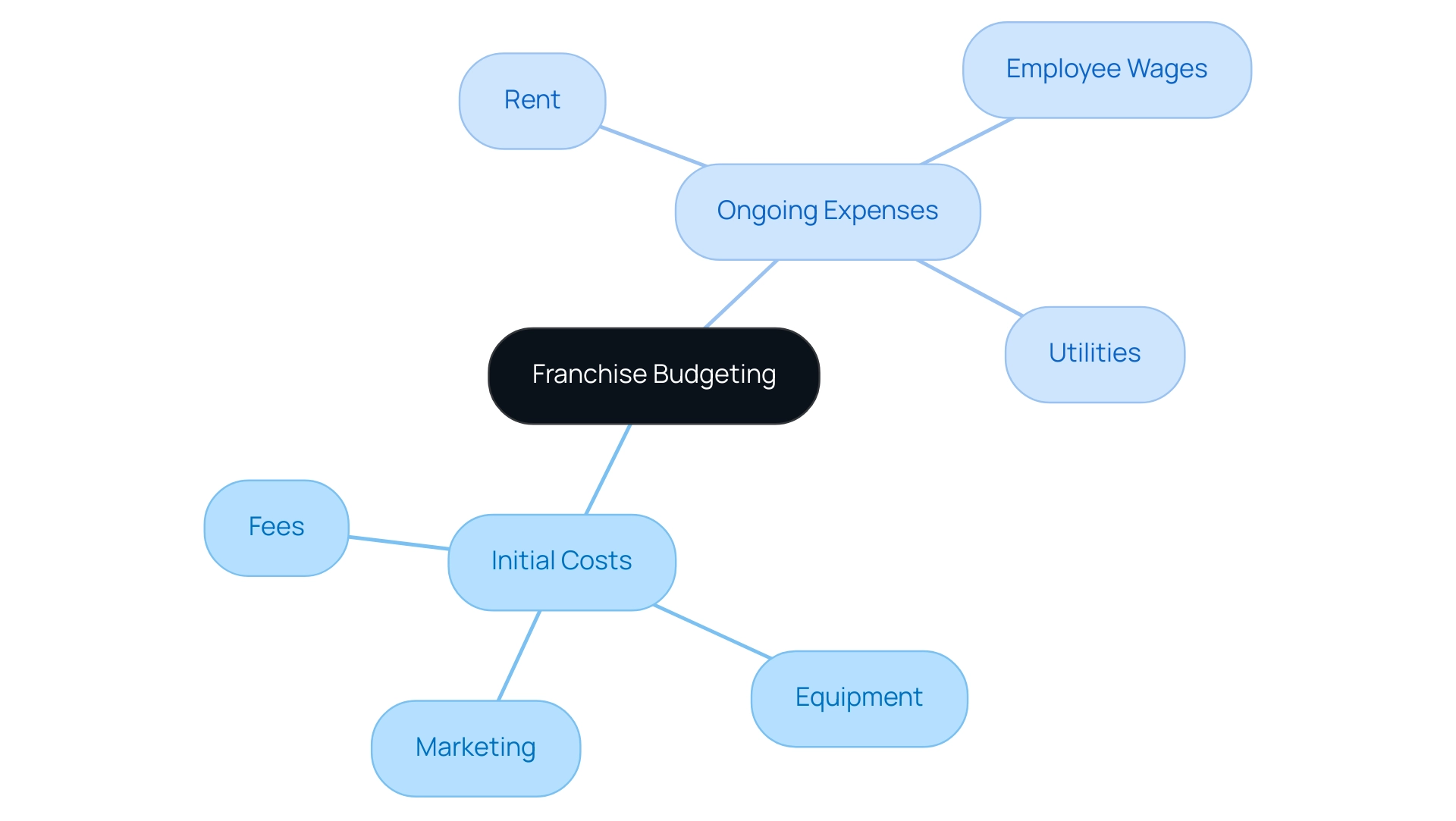
Understanding the Return on Investment (ROI)
Calculating the cost to start a franchise is crucial for anyone considering a career transition, especially when evaluating franchise ownership. This involves assessing the cost to start a franchise against expected returns over time. Franchisees should not only focus on projected revenue and profit margins but also evaluate the emotional and practical effects of income growth on their economic stability, particularly regarding the stress caused by unfair or disproportionate salaries.
A common formula for calculating ROI is:
(Net Profit / Total Investment) x 100
By understanding these metrics, aspiring business owners can make informed, data-driven decisions regarding the cost to start a franchise and their potential ventures. Additionally, investing in a franchise can offer a structured route to economic stability, often with lower risks compared to starting a business from scratch, making it a compelling option alongside remaining in Corporate America or pursuing entrepreneurship.
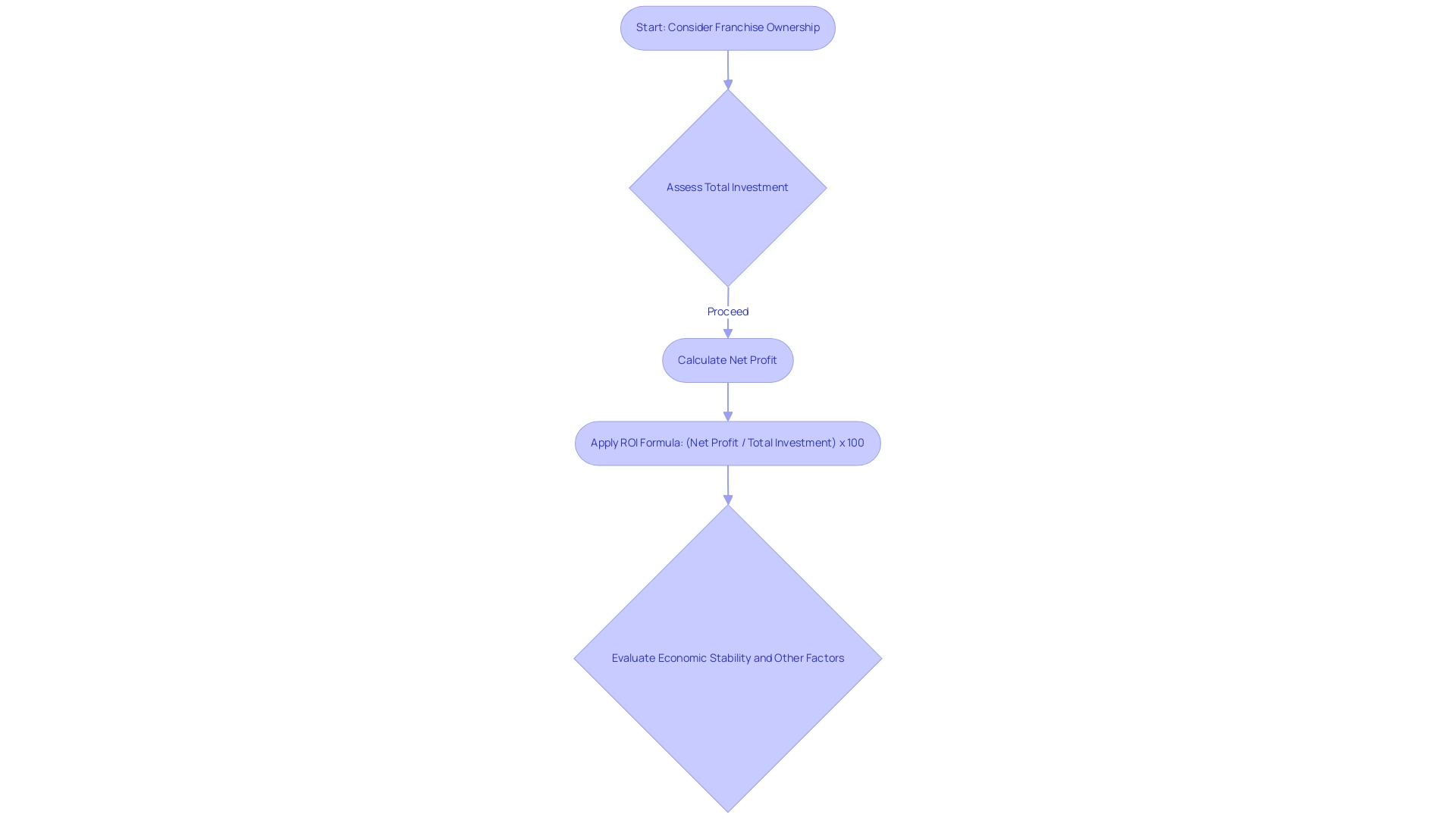
Planning for Long-Term Financial Success
For business owners seeking enduring success, it is essential to create a thorough long-term monetary plan that takes into account different funding alternatives. This includes exploring resources offered by the U.S. Small Business Administration, which provides funding options such as:
- 7(a) loans
- Microloans
- CDC/504 loans tailored for small businesses
Additionally, utilizing self-funding mechanisms through checking and savings accounts can provide immediate liquidity for essential business needs; for instance, maintaining a dedicated business savings account can assist business owners in managing cash flow and setting aside funds for unexpected expenses.
Regular fiscal reviews are essential, assessing performance against established growth targets. Reinvesting profits back into the business can significantly enhance its potential for expansion. Staying attuned to market trends is crucial; adapting business strategies in response to these trends can provide a competitive edge.
Engaging with advisors or actively participating in franchise networks can yield valuable insights, enabling franchisees to effectively navigate challenges and maximize growth opportunities. A pertinent example is H&R Block’s Tax Professional Referral Program, which successfully recruited skilled tax professionals through existing networks. This initiative not only ensured high-quality service during peak tax season but also demonstrated how strategic networking can provide tangible benefits.
Furthermore, the coffee shop licensee’s success in negotiating the royalty fee down to 8% of gross sales exemplifies the importance of financial negotiation strategies. Licensees should also be decisive and proactive after Discovery Days, as taking initiative in the early stages of ownership is crucial. As John Doe aptly noted, ‘These case studies demonstrate that when executed effectively, referral programs can be a game-changer for business ventures.’
Adopting such innovative approaches, along with effective funding strategies, can be transformative in achieving long-term financial success within the franchise landscape.
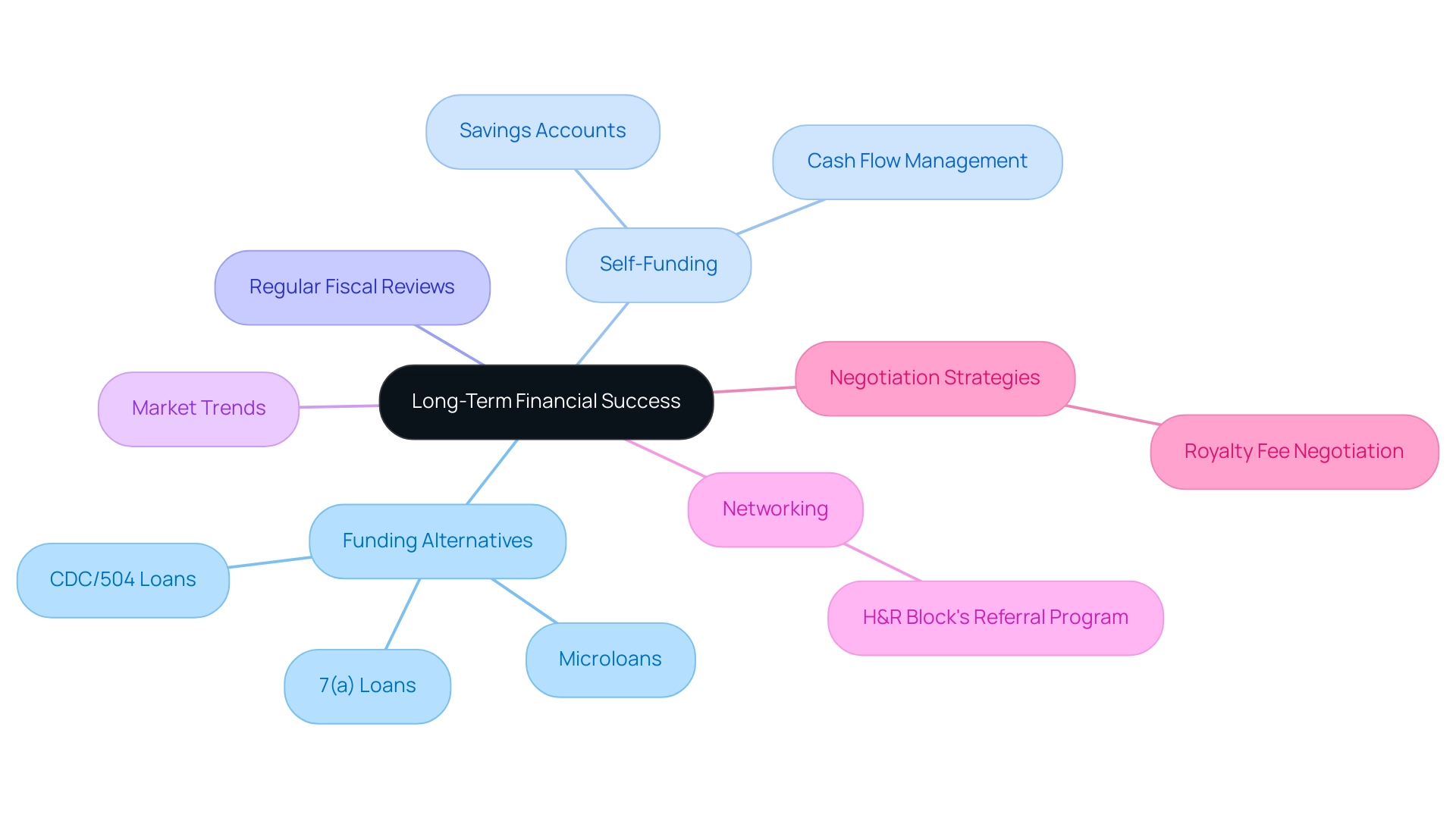
Conclusion
Navigating the financial landscape of franchise ownership is a multifaceted endeavor that requires a keen understanding of various costs and funding options. From the initial franchise fees to ongoing royalties and marketing contributions, aspiring franchisees must take a comprehensive approach to budgeting. The case studies highlighted in this article, such as BCHEF and KFC, underscore the importance of strategic financial planning and the potential for growth within the franchise model.
Exploring financing options is equally critical, with traditional loans, SBA loans, and alternative funding sources offering viable pathways for obtaining necessary capital. Each option presents unique advantages, making it essential for franchisees to assess their individual circumstances and choose the best fit for their business goals. Additionally, a thorough evaluation of franchise agreements can reveal hidden costs and obligations that may impact long-term profitability. Engaging legal expertise in this area can safeguard against costly missteps.
Finally, establishing a robust long-term financial strategy is vital for sustained success. This involves not only budgeting for initial and ongoing expenses but also regularly reviewing financial performance against growth targets. By adapting to market trends and leveraging strategic networks, franchisees can enhance their potential for expansion and profitability. With careful planning and informed decision-making, aspiring franchise owners can navigate the complexities of franchise financing and set the stage for a thriving business venture.


